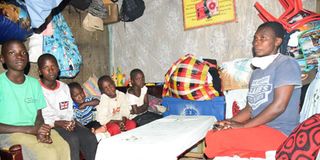What Budget means for female-headed homes

What you need to know:
- Female-headed households to benefit after MPs approved tax exemptions introduced in the 2020/21 Budget
- New tax regime could result to cheaper basic commodities, positively impact the socio-economic status of the female-headed households.
- More tax exempt on basic consumables means women spend less of their income and saving more for long-term investments .
- In Kenya, 32.4 per cent of households are headed by women.
- 30.2 per cent of female-headed households poor compared to 26 per cent of those led by male.
Female-headed households, without the benefit of shared income, may have something to smile about after MPs approved tax exemptions introduced in the 2020/21 Budget last month.
Parliament also accepted zero-rating of maize, wheat and cassava flours. The flours are the main sources of daily dietary intake for 47.6 million Kenyans.
The enforcement of the new tax regime could, thus, result to cheaper basic commodities, positively impact the socio-economic status of the female-headed households.
Currently, a 2kg packet of maize flour costs between Sh114 and Sh224. An equal weight of wheat flour goes for between Sh104 and Sh165, while 2kg of cassava flour is selling at an average price of Sh225.
Further, the Budget granted duty remission on inputs for new clothing and apparels. Thus, the cost of locally manufactured clothing for adults and children is expected to drop.
Similarly, imported raw materials for manufacturing diapers were exempted from import duty. This would translate to one diaper selling for below the current average price of Sh25.
LONG-TERM INVESTMENTS
Women are likely to spend less on basics like food and clothing, offering them an opportunity to divert the extra money to savings for long-term investments like medical cover and education for their children, among other needs.
In Kenya, 32.4 per cent of households are headed by women. Poverty levels for these households are, however, higher than those led by men.
Data from Kenya National Bureau of Statistics shows that 30.2 per cent of female-headed households are poor compared to 26 per cent of those led by male.
Contrastingly, GenderGap.AFRICA shows that women make $89 (Sh8,900) less than men per month. Their lesser earnings are further thinned out to meet the cost of highly priced basic necessities. This leaves them with little or nothing to save.
An analysis on Gender and Taxation in Kenya by Institute of Economic Affairs shows that female-headed households bear a greater Value Added Tax (VAT) burden than male-headed households by virtue of earning lesser income.
GENDER EQUITY
“Therefore, a tax policy geared towards exemption of basic commodities, combined with a policy to improve female participation in the labour market would have a positive impact on gender equity in taxation compared to implementation of tax policy alone,” reads a recommendation in the analysis report.
Ms Alice Moraa heads a five-member family with an average monthly income of Sh9,000. Her husband died in 2001. She was left with four children to raise.
Eighty per cent of her income, earned from selling handmade carpets, goes into food expenditure.
“A 2kg packet of maize flour lasts for just a day if I cook lunch and supper,” says Ms Moraa, who lives with her children in a Sh4,500 rent room in Lucky Summer in Nairobi.
“I currently buy the two kilogram packet for Sh120. My wish is that it is reduced to Sh100. I would invest the Sh20 in table-banking to boost my shares to increase my limits for education loans,” she adds.
In a month, her family spends about Sh3,600 on maize flour only. If reduced by Sh20, Ms Moraa would save Sh600.
The Sh600 would secure her Sh1,800 as education loan since table-banking groups offer loans three times the savings. This would offset fee arrears for her son in Form Two or buy books for her Class Three and Class Four daughters.
She says they are often forced to forgo lunch to extend consumption of the flour and cut on the household expenditure.
They also consume 8kg of wheat flour monthly, amounting to Sh1,040 based on the current price of Sh130 per 2kg.
Ms Caroline Achieng’, a hairdresser in Lucky Summer, is also raising three children “There are days profits are as high as Sh4,000 and then there are days when you go home with only Sh150. But often the profits are about Sh1,200,” she says.
POVERTY LEVELS
She proposes the sugar, rice, maize and wheat flours to retail at a uniform price of Sh80 per kilogram.
For her, maize flour is the main ingredient for porridge for breakfast and ugali for lunch and supper.
They cook twice a kilo of rice going for Sh140 while a kilo of sugar, which she buys at Sh125, barely lasts two weeks.
“I will save up to Sh1,500 if they reduce the price to Sh80,” says Ms Achieng’ who lives with her children in a double room rented for Sh6,000.
“I have always wanted to save more money so that I can buy land, but that dream is yet to come true,” she adds.
“I am in a group where we contribute Sh500 monthly, but I often default because of financial constraints.”
As at now, Ms Moraa and Ms Achieng’s households are extremely poor since monthly expenditure per family member is below Sh2,551. They reflect the poverty levels of more than 11 million households headed by women across the country.
According to Kenya’s statistics agency, an adult in the urban areas is considered poor if he or she spends less than Sh83.86 a day to meet the daily calorie requirement. For those in rural areas they need to spend above Sh64.23 to escape the extreme poverty lining.
The decline in prices of commodities that consume largest share of household income would, however, be dependent on other factors influencing manufacturing of low cost products.
For instance, industrial plant and machinery will, under the new tax structure, attract a 14 per cent VAT. This would water down zero-rating of wheat, maize and cassava flours.
Chief Executive Officer for Kenya Association of Manufacturers Phyllis Wakiaga says: “The additional cost of investment will result in more expensive goods for consumers.”
“It is important for the government to critically look at the impact of taxes on women, especially those who lead households to create a balance between tax exempt and non-exempt goods,” says Tom Nyamache an economist.
“Having more tax exempt basic consumables means women spending less of their income and saving more.”





